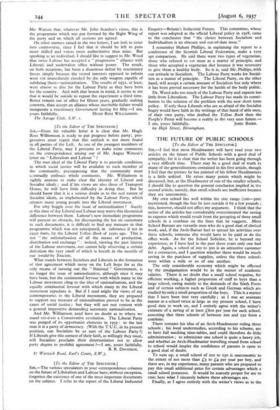[To the Editor of THE SPECTATOR.] SIR,—From his valuable letter
it is clear that Mr. Hugh Ross Williamson is ready to put progress before party; pro- gressives must regret that this outlook is not more found in all parties of the Left. As one of the youngest members of the Liberal Party, may I presume to make some comments on the correspondence, arising out of Mr. Angus Watson's letter on " Liberalism and Labour " The root ideal of the Liberal Party is to provide conditions in which social justice will be available to each member of the community, presupposing that the community must eventually embrace whole continents. Mr. Williamson is rightly anxious to make clear the identity of Liberal and Socialist ideals ; and if his views are also those of Transport House, he will have little difficulty in doing that. But he should know that it is a serious doubt as to the real nature of Socialist ideals, as implemented by the Labour Party, which attracts many young people into the Liberal movement.
For why boggle over the issue of nationalisation ? Surely at this time of day Liberal and Labour may waive this theoretical difference between them. Labour's new immediate programme will present no obstacle, for discounting the hot air customary in such documents, it is difficult to find any measure in that programme which was not anticipated, in substance if not in exact form, by the Liberal Yellow Book of years ago. This is not " the nationalisation of all the means of production, distribution and exchange " : indeed, viewing the past history of the Labour movement, one cannot help observing a certain defeatism the very smell of which is breath in the nostrils of our would-be Fascists.
What stands between Socialists and Liberals in the formation of that agreement which many on the Left hope for as the only means of turning out the " National " Government, is no longer the issue of nationalisation, although once it may have been, but the sentimental fervour with which many in the Labour movement cling to the idea of nationalisation, and the equally sentimental fervour with which many in the Liberal movement repudiate it. But if I read aright the views of my contemporaries in the Liberal movement, they are prepared to support any measure of nationalisation proved to be in the cause of social justice ; but they will not rest content with a general imperative demanding automatic nationalisation.
And Mr. Williamson need have no doubt as to where we stand vis-d-tris a Conservative revolution. The Liberal Party was purged of its opportunist elements in 1932: to the last man it is a party of democracy. (With the T.U.C. in its present position, can Socialists be so sure of the Labour Party ?) If Liberals give this earnest of their faith, as willingly they must, will Socialists proclaim their determination not to allow party dogma to prohibit agreement ?—I am, yours faithfully, 87 Warwick Road, Earl's Court, S.W.S. B. R. DAVIDSON.






































 Previous page
Previous page